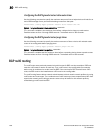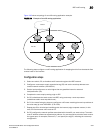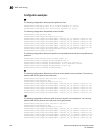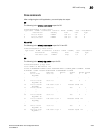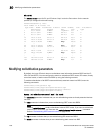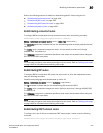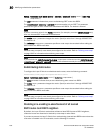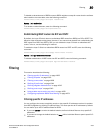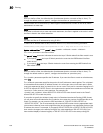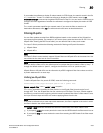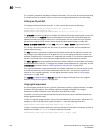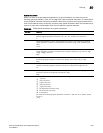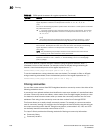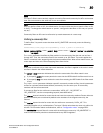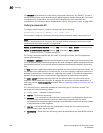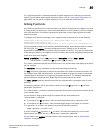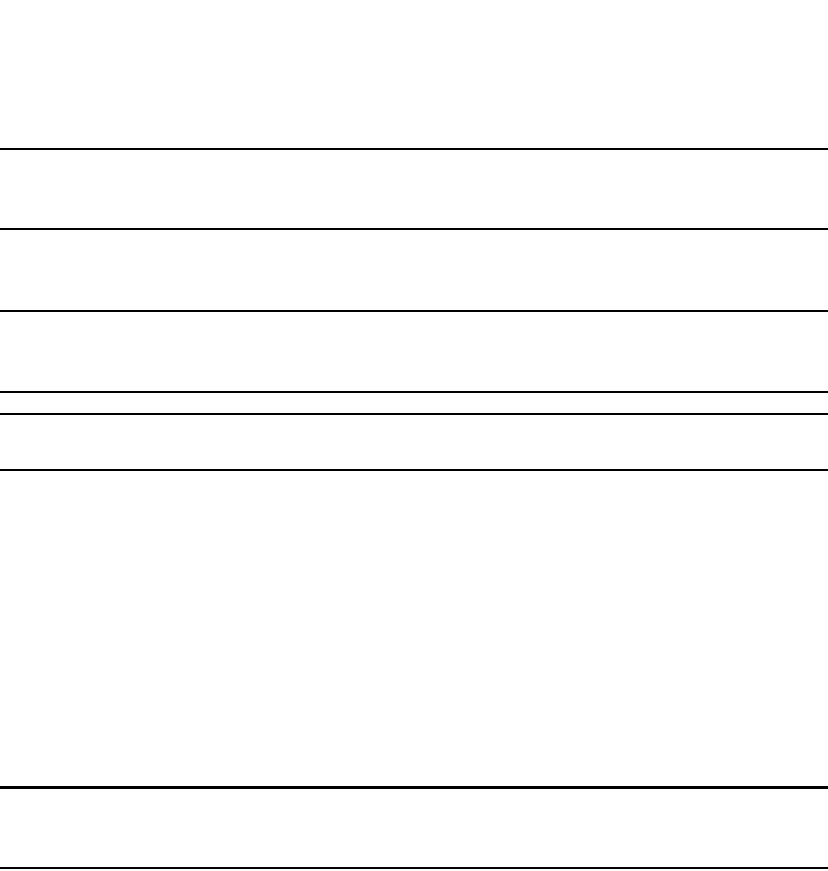
1034 PowerConnect B-Series FCX Configuration Guide
53-1002266-01
Filtering
30
NOTE
Once you define a filter, the default action for addresses that do not match a filter is “deny”. To
change the default action to “permit”, configure the last filter as “permit any any”.
Address filters can be referred to by a BGP neighbor's distribute list number as well as by match
statements in a route map.
NOTE
If the filter is referred to by a route map match statement, the filter is applied in the order in which
the filter is listed in the match statement.
NOTE
You also can filter on IP addresses by using IP ACLs.
To define an IP address filter to deny routes to 209.157.0.0, enter the following command.
PowerConnect(config-bgp-router)#address-filter 1 deny 209.157.0.0 255.255.0.0
Syntax: address-filter <num> permit | deny <ip-addr> <wildcard> <mask> <wildcard>
The <num> parameter is the filter number.
The permit | deny parameter indicates the action the Layer 3 Switch takes if the filter match is true.
• If you specify permit, the Layer 3 Switch permits the route into the BGP4 table if the filter
match is true.
• If you specify deny, the Layer 3 Switch denies the route from entering the BGP4 table if the
filter match is true.
NOTE
Once you define a filter, the default action for addresses that do not match a filter is “deny”. To
change the default action to “permit”, configure the last filter as “permit any any”.
The <ip-addr> parameter specifies the IP address. If you want the filter to match on all addresses,
enter any.
The <wildcard> parameter specifies the portion of the IP address to match against. The <wildcard>
is in dotted-decimal notation (IP address format). It is a four-part value, where each part is 8 bits
(one byte) separated by dots, and each bit is a one or a zero. Each part is a number ranging from 0
to 255, for example 0.0.0.255. Zeros in the mask mean the packet source address must match the
<source-ip>. Ones mean any value matches. For example, the
<ip-addr> and <wildcard> values 209.157.22.26 0.0.0.255 mean that all hosts in the Class C
subnet 209.157.22.x match the policy.
If you prefer to specify the wildcard (mask value) in Classless Interdomain Routing (CIDR) format,
you can enter a forward slash after the IP address, then enter the number of significant bits in the
mask. For example, you can enter the CIDR equivalent of “209.157.22.26 0.0.0.255” as
“209.157.22.26/24”. The CLI automatically converts the CIDR number into the appropriate mask
(where zeros instead of ones are the significant bits) and changes the non-significant portion of the
IP address into zeros. For example, if you specify 209.157.22.26/24 or 209.157.22.26 0.0.0.255,
then save the changes to the startup-config file, the value appears as 209.157.22.0/24 (if you
have enabled display of subnet lengths) or 209.157.22.0 0.0.0.255 in the startup-config file.



